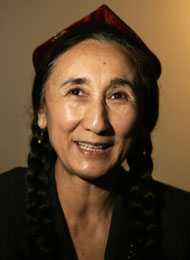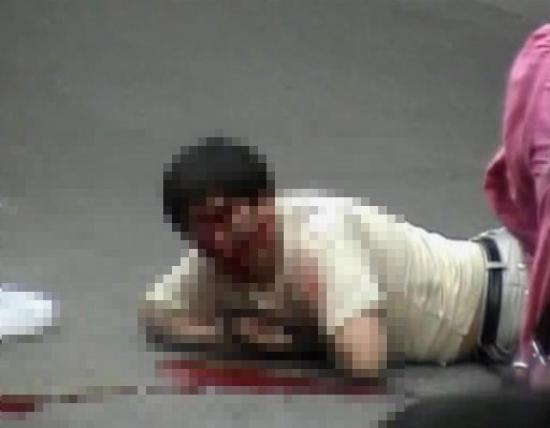 Rebiya Kadeer is a former businesswoman whose activistism on behalf for the rights of China’s Uighur ethnic group, to which she belongs, led to her jailing and exile.
Rebiya Kadeer is a former businesswoman whose activistism on behalf for the rights of China’s Uighur ethnic group, to which she belongs, led to her jailing and exile.
In 2005, she was released to the United States from her prison cell in China. Now settled in Washington, she has become the public face of an ethnic group that is little known in much of the world. Although her fame hardly approaches that of the Dalai Lama, the spiritual leader of the Tibetans, Ms. Kadeer has come to personify the Uighur cause, and that status may only grow with China’s denunciations.
Ms. Kadeer first gained fame as an astute businesswoman and then a favored example of China’s claims of multiethnic harmony. She built an empire of trading companies and a department store and was even appointed to China’s national legislative body. But Communist Party leaders became suspicious of her loyalties in the late 1990s. She was arrested in 1999 and sentenced to eight years for betraying state secrets.
Under pressure from the United States and international organizations, she was released to exile in March 2005. She was soon elected president of two exile groups, the Uighur American Association, which represents the 1,000 or so Uighurs in the United States, and the World Uighur Congress, an umbrella for 47 groups worldwide, with headquarters in Munich.
Both groups receive much of their funding from the National Endowment for Democracy, a bipartisan organization created and financed by the United States Congress that promotes democracy worldwide. They engage in research and advocacy on human rights issues that affect the Uighur people.
Although the Chinese government has accused Ms. Kadeer and her groups of abetting terrorism, the organizations say they reject ties to violence or Islamic extremism. They call for democracy and “self-determination” for the Uighurs, side-stepping the explosive issue of independence.
When riots broke out in Uighur cities in July 2009, the Chinese government accused her of fomenting the violence, a charge she angrily denied.
Since then, Ms. Kadeer and the Chinese government have ratcheted up their war of words, each blaming the other for the violence that no one denies claimed the lives of at least 197, while injuring more than 1700.
In July 2009, on a visit to Japan, Ms. Kadeer claimed that “nearly 10,000” Uighurs had disappeared “overnight” in Urumqi, the Xinjiang capital. “Where did they go?” she asked during a news conference. “Were they all killed or sent somewhere? The Chinese government should disclose what happened to them.” She did not provide evidence to back up her assertion.
But her comments infuriated China, which summoned Japan’s ambassador in Beijing to express “strong dissatisfaction” with the decision to grant her a visa.
The true story of what happened in Urumqi may never be known. But Ms. Kadeer’s and the Chinese government’s dueling accounts have sowed confusion and created an even wider chasm between the Chinese government and those pressing for greater Uighur autonomy.
In April 2009, Ms. Kadeer published an autobiography, “Dragon Fighter: One Woman’s Epic Battle for Peace with China.” In the New York Times Book Review section, Howard French summarized her life story this way:
“Through sheer force of personality Ms. Kadeer overcomes a bad marriage to an abusive husband, then seeks out and marries a former political prisoner and poet, telling him flatly that “after our wedding, our first task will be to liberate the land.”
“Years, several children and many arduous commercial voyages across China later, having built a fortune (and a big reputation) in department stores and real estate, while she and her second husband dreamed of liberating the land, Ms. Kadeer begins to attract the wooing calls of the party. Her big moment comes in a speech before the Congress in Beijing, in which she boldly switches the approved text to ask: “Is it our fault that the Chinese have occupied our land? That we live under such horrible conditions?”
“If not the first time she had spoken truth to power, it was certainly the beginning of the end. Soon afterward Ms. Kadeer was arrested on her way to a meeting with a member of the United States Congress. She was tried, imprisoned for nearly six years and exiled to the United States.”
via Rebiya Kadeer News – The New York Times.







